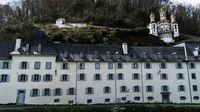In a shocking revelation, Hélène Perlant, the daughter of French Prime Minister François Bayrou, has come forward to share her experience of physical abuse during her teenage years. In an interview published on April 22, 2025, in Paris Match, she described a harrowing incident that occurred while attending a summer camp organized by the Catholic institution Notre-Dame de Bétharram, situated in the Pyrénées-Atlantiques. This admission comes alongside the release of the book Le Silence de Bétharram, authored by Alain Esquerre, a spokesperson for the victims' collective associated with the scandal.
Perlant recounted a violent episode from 1983 when she was just 14 years old. "One evening, while we were unpacking our sleeping bags, Father Lartiguet suddenly grabbed me by the hair, dragged me on the ground for several meters, and beat me with punches and kicks all over my body, especially in the stomach. He weighed about 120 kilos," she revealed. The trauma of the assault left her so shaken that she stated, "To put it bluntly, I urinated on myself and remained like that all night, wet and prostrated in my sleeping bag." Now 53, she emphasized that she had never disclosed this experience to her father, stating, "He doesn’t know that I am a victim, and he doesn’t know that I will testify as a victim."
Hélène Perlant's testimony adds to a growing list of accounts from former students of the institution, many of whom have come forward in recent weeks to report their own experiences of physical and sexual abuse within the school system. The timing of her revelation is particularly significant, as it coincides with heightened scrutiny of the institution and a parliamentary inquiry into the allegations surrounding it.
In her interview, Perlant explained her long silence, saying, "I stayed silent for thirty years. Not a word to anyone. I may have wanted to protect my father, unconsciously, from the political blows he was facing locally." This sentiment reflects the complex relationship she has with her father, who has been accused by some of ignoring warnings about the abuses occurring at the school, where several of his children were enrolled, and where his wife taught catechism.
The inquiry into the Bétharram scandal is set to hear from François Bayrou on May 14, 2025. He has been accused of failing to act on reports of abuse and even intervening in an investigation related to one of the school's former directors, allegations he has consistently denied. Perlant's comments suggest that she believes her father's political entanglements may have clouded his awareness of the situation. "He was very, very politically entwined locally, much more than other parents. But I consider him on the same level as all parents. The more involved you are, the less you see and understand," she explained.
Furthermore, Perlant's reflections on the culture at the Notre-Dame de Bétharram institution paint a disturbing picture. She described it as being organized like a cult or totalitarian regime, exerting psychological pressure on students and teachers to remain silent about the abuses. "Bétharram was organized like a sect or a totalitarian regime exercising psychological pressure on students and teachers to keep them quiet," she stated, highlighting the environment that allowed such violence to persist unchecked for years.
The fallout from these revelations has been significant, with over 200 individuals coming forward to report instances of physical and sexual abuse at the institution. In response to these allegations, the French Minister of Education, Élisabeth Borne, announced the initiation of an administrative investigation into the school, following a report that highlighted unacceptable behaviors from two teachers.
As the inquiry progresses, Hélène Perlant's voice adds a crucial perspective to the ongoing discussions about accountability and transparency within institutions that are supposed to safeguard children. Her courage in breaking her silence is a testament to the struggles many victims face in coming forward, especially when they are connected to influential figures.
Perlant's story is not just a personal account of trauma; it is emblematic of a broader issue within educational and religious institutions where power dynamics often silence victims. As she prepares to publish her experiences in Le Silence de Bétharram, the hope is that her testimony will encourage others to speak out and that it will prompt a reckoning for those who have turned a blind eye to the suffering of countless students.
In the wake of these revelations, the public and political discourse around the Bétharram scandal is likely to intensify. With François Bayrou set to testify before the parliamentary commission, the implications of these allegations could have lasting effects on his political career and the future of educational oversight in France.
As the investigation unfolds, many are left wondering how such a culture of silence could have been allowed to thrive for so long and what steps will be taken to ensure that similar abuses are not repeated in the future. Hélène Perlant’s brave decision to share her story is a critical step in bringing these issues to light and seeking justice for the victims.
The upcoming publication of Le Silence de Bétharram is anticipated to shed further light on the systemic issues within the institution, and it is hoped that it will serve as a catalyst for change, ensuring that the voices of the victims are heard and validated.







